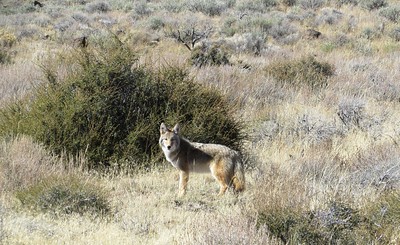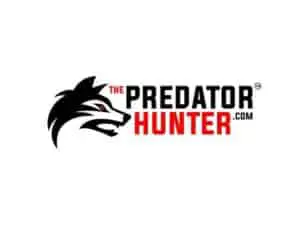Are you thinking about hunting coyotes in Kansas? Coyotes are found throughout Kansas but are most numerous in the eastern two-thirds of the state. Below you will find specific legal requirements for hunting coyotes in Kansas. However, make sure you check for updates and changes, as state laws are frequently altered.

Coyote hunting in Kansas is allowed all year. A hunting license is required, but there are no bag limits. A recent change to the law provides for the legal use of night vision and thermal riflescopes, but a permit is required.
Purchase a license here: https://ksoutdoors.com/Hunting/Applications-and-Fees.
Check out the Kansas hunting seasons.
Related: Read the laws for hunting fox in Kansas.
Related: Read the laws for hunting bobcats in Kansas.
Hunting coyotes in Kansas.
DISPLAY OF CARCASSES
It is unlawful for any person to display the carcass of a coyote. “Carcass” means the body of the coyote, either as part or as a whole, and either with the skin intact or removed. The skin of the coyote, when removed from the body, shall not be considered part of the coyote.
This statute does not apply to the display of the car cass of a coyote at a fur market or the use of the carcass of a coyote for educational and training purposes.
GENERAL LEGAL EQUIPMENT for Furbearer and Coyote Hunting
Firearms (except fully automatic) and archery equipment.
Furbearer and Coyote Trapping – smooth-jawed foothold traps (except that all types of foot-hold traps may be used in water sets), body-gripping traps, box traps, cage traps, snares, colony traps, and deadfalls.
SPECIAL EQUIPMENT
Calls, lures, baits, and decoys may be used to take furbearers and coyotes.
Related: Read this article: How to make the perfect bait pile.
Related: What are the two most favorite call coyote hunters use? Read more here.
Night hunting coyotes in Kansas.
Special Equipment Approved For Hunting Coyotes at Night in Kansas
Interested hunters must purchase a Night Vision Equipment Permit, $2.50, to use artificial light, scopes, and equipment that amplify visible light, and thermal imaging scopes and thermal-imaging equipment, when hunting coyotes at night, with the following restrictions:
· Use of this equipment will be permitted from January 1 to March 31 only;
· Use of this equipment will require a hunter to possess a Night Vision Equipment Permit, $2.50;
· Use of this equipment will be permitted for hunting coyotes only;
· Use of a vehicle when hunting with this equipment is prohibited;
· Use of this equipment will not be permitted on department lands and waters, including WIHA and iWIHA properties.
Check Amazon prices for night hunting scopes here.
Licenses required for hunting coyotes in Kansas.
HUNTING LICENSE
All resident hunters aged 16 through 74 must have a resident hunting license unless exempt. Nonresident hunters, regardless of age, must have a non-resident license. Annual hunting licenses expire one year from the date of purchase. Resident hunters age 65-74 qualify for Senior Pass lifetime hunt/fish combination licenses ($42.50), senior annual hunting licenses ($15), or annual hunt/fish combination licenses ($25).
Residents aged 16-20 qualify for Youth Multi-year hunting ($42.50) or hunt/fish combination licenses ($72.50), which expire at the end of the year they turn 21. A resident is defined as a person who has maintained that person’s place of permanent abode in the state for 60 days prior to purchase.
Domiciliary intent is required, evidence of which may include where a person votes, pays personal income taxes or obtains a driver’s license. Residency of at least one year is required to purchase lifetime licenses.
Lifetime license holders are considered Kansas residents for hunting permits and tags, even if they no longer live in Kansas. Hunters may purchase a special license that is valid only on controlled shooting areas.
Nonresidents who are full-time secondary, post-secondary, or vocational students at Kansas schools and are living in Kansas may obtain resident hunting licenses and permits but must carry evidence of Kansas student status. They may NOT purchase lifetime licenses.
FUR HARVESTING LICENSE
A fur harvester license is required to hunt, trap, or pursue (run) furbearing animals or to sell their pelts. A fur harvester license is required to trap coyotes, and a hunting license is required to hunt them.
The same license required to take coyotes is required to sell their pelts. Unlicensed, non-participating observers may accompany a licensed fur harvester but may not carry or use equipment, control dogs, or otherwise assist with fur harvesting activities. Residents 15 and younger may purchase a junior fur harvester license at a reduced price. Youth 13 and younger accompanied by a licensed fur harvester are exempt.
Illegal pursuit when hunting coyotes in Kansas.
No game or furbearer may be shot at, killed, or pursued from aircraft, motor car, motorboat, or another vehicle. (Exceptions include hunting with a Disability permit, hunting waterfowl from a stationary boat, and hunting coyotes.)
It is illegal to locate or give information concerning the location of game animals by radio or other mechanical means, except for coyotes, as outlined in the legal methods section.
No wild gamebird (except turkey) may be shot at unless that bird is in flight. Turkeys may be shot on the ground or in flight, but not while sitting in trees.
TRAP SIZE RESTRICTIONS
The following may only be used in water sets: body-gripping traps with inside jawspreads 8 inches or greater; and foothold traps with outside jaw-spreads greater than 7 inches. Measurements should be taken across the jaws of both trap types at a 90-degree angle. “Water set” means any trapping device in which the gripping portion is placed at least half-submerged in flowing or impounded waters and remains in contact with the water.
SNARES
Snares are prohibited in dryland sets within 50 feet of the outside edge of a public road or within five feet of a fence bordering a public road. Landowners and tenants or their family members or agents may use snares in rights-of-way adjacent to their lands

